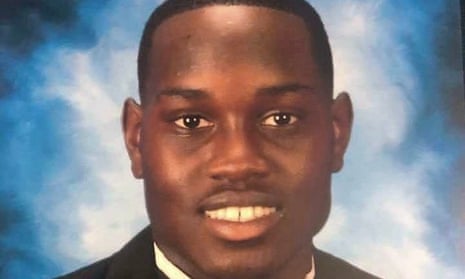In the days and weeks after Ahmaud Arbery was shot and killed, multiple Glynn county law enforcement officials failed to thoroughly investigate his death and, in one case, refused to allow police officers to make arrests, the Guardian has learned.
Arbery, 25, was jogging through the neighborhood just outside Brunswick, Georgia, on 23 February when he was shot dead by two white men. Gregory McMichael, 64, and his son Travis, 34, were charged with murder and aggravated assault on Thursday evening, after graphic video footage of the killing was released publicly and sparked national outrage.
Lawyers for Arbery’s family have called the killing a “modern lynching” and decried the lack of action in the case prior to the release of the video, pointing to racial inequalities in the criminal justice system.
In the police report, Gregory McMichael claimed Arbery “violently attacked” his son, who shot Arbery in self defense.
Jackie Johnson, the Glynn county district attorney, refused to allow police officers who responded to arrest the two men, Glynn county commissioner Peter Murphy told the Guardian in a phone call on Friday.
The police department was put in touch with one of Johnson’s assistant district attorneys after the shooting, but Johnson made the decision not to charge the father and son, the former having worked in her office for more than 20 years, Murphy said.
“The police at the scene went to her, saying they were ready to arrest both of them,” Allen Booker, the Glynn county district 5 commissioner, told the Atlanta Journal-Constitution on Friday. “These were the police at the scene who had done the investigation. She shut them down to protect her friend McMichael.”
Days later, Johnson recused herself. Johnson did not immediately respond to a request for comment.
By 27 February, George Barnhill, the Waycross judicial district attorney, and the second of three DAs on the case, took over. Less than 24 hours after seeing the video and evidence compiled by the police, Murphy said, Barnhill decided to not charge the McMichaels.
“And so within 24 hours the Glynn county police had been told by two separate DA offices not to make any arrests,” Murphy said. “And obviously, they want to assume no responsibility for their actions.”
On 2 April, Barnhill sent an email to law enforcement authorities saying Arbery had an “apparent aggressive nature” and that his family were “not strangers to the local criminal justice system”.
“Arbery’s mental health records & prior convictions help explain his apparent aggressive nature and his possible thought pattern to attack an armed man,” Barnhill said in the email, which was first reported by the New York Times.

“What it appears is he was purposely trying to assault the character of the victim and there’s just no reason why,” said Chris Stewart, one of the lawyers representing Arbery’s family.
The family have pointed to the McMichaels’ connection to local law enforcement both at the district attorney’s office and police department as evidence of systemic flaws and roadblocks in their search for justice. It was only after the video of Arbery’s death was released this week that the third DA’s office requested the Georgia Bureau of Investigations (GBI) get involved.
On Friday, GBI director Vic Reynolds told reporters he could not “answer what another agency did or didn’t see” in the first two months of the investigation.
“But I can tell you that based on our involvement in this case and considering the fact we hit the ground running Wednesday morning and within 36 hours we had secured warrants for two individuals for felony murder, I think that speaks volumes for itself.”
In a 7 April email sent to the office of Georgia attorney general Chris Carr, Barnhill recused himself because his son worked on a case involving Arbery while working in Johnson’s office.
Lee Merritt, one of the lawyers who represents Arbery’s family, said Wanda Cooper-Jones, Arbery’s mother, found the connection between Barnhill’s son and her own on Facebook and brought it to the attention of his office.
“She followed the links. That’s exactly how it happened,” he said to the Guardian on Friday by phone.
According to a police report filed 23 February, Gregory and Travis McMichael grabbed their weapons, a .357 Magnum revolver and a shotgun, jumped into a truck and followed Arbery as he ran.
In the email to Carr from early April, Barnhill references a “decent cell phone video of the entire shooting incident”, an apparent reference to the one leaked this week.
Reynolds said on Friday that the investigation into the shooting, the video and the person who filmed it, would continue.
“Every stone will be uncovered,” Reynolds said.
